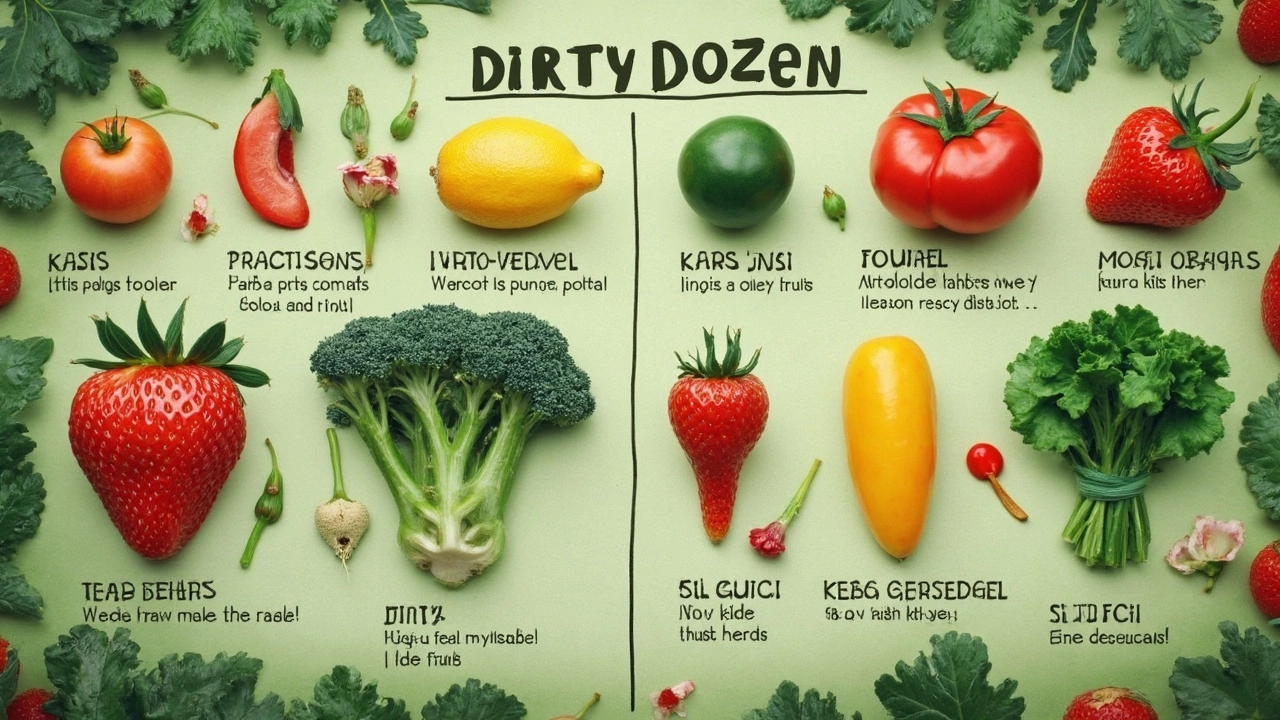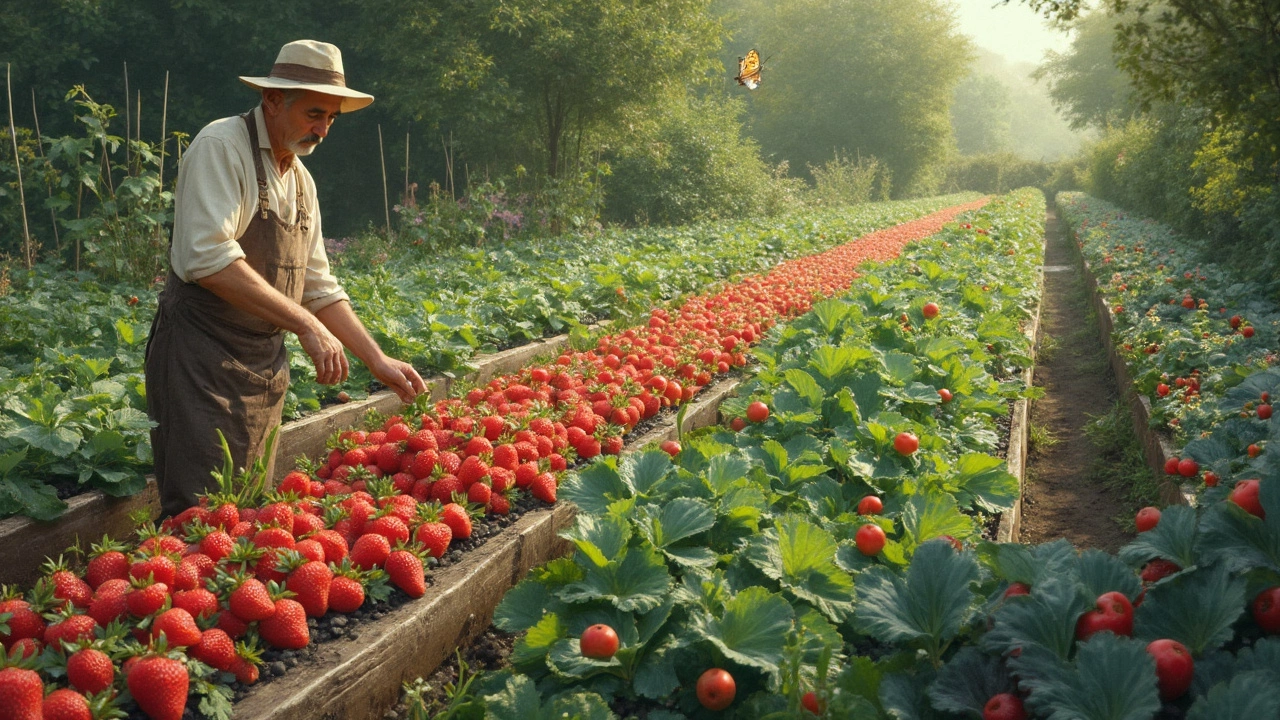Ever heard of the 'Dirty Dozen'? Nope, it's not a secret band of rogue gardeners. It's actually about fruits and veggies! And if you're into organic gardening, this is something to pay attention to. The Dirty Dozen is a list of produce items that tend to have the most pesticide residue. Yikes, right?
Now, you might wonder, why should you care? Well, if you're growing your own produce at home, knowing which ones are more heavily sprayed can help you decide what to focus on. For example, if strawberries keep popping up on this list, maybe it's smarter to grow them organically yourself.
- Understanding the Dirty Dozen
- Why Does It Matter?
- Gardening Tips for Avoiding Pesticides
- Annual Updates and Changes
Understanding the Dirty Dozen
So what exactly is this Dirty Dozen business? It's a list, but not just any list. This one is put together every year by the Environmental Working Group (EWG), and it points out the fruits and veggies most likely to have high levels of pesticides. Pretty eye-opening, huh?
Usually, these foods have thin skins or are eaten whole, making it hard to scrub off all those chemicals. Think strawberries, spinach, and apples—these guys often top the list. But what makes this list super handy for anyone into organic gardening is that it shows you which produce might be worth growing yourself, pesticide-free.
Why does the list change every year? Pesticide use, agriculture practices, and testing methods often shift, so what's clean one year might be not so clean the next. The point is to give you the heads-up so you can make smarter choices whether you're at the grocery store or in your own garden.
Here's a quick look at a recent Dirty Dozen list—it’s like your cheat sheet for growing the safest produce:
- Strawberries
- Spinach
- Kale, collard, and mustard greens
- Nectarines
- Apples
Of course, the list goes on, but these are some big players to be aware of. If they're on your gardening wishlist, going organic might be the way to go to dodge those nasty chemicals.
Why Does It Matter?
Alright, so why should you care about the Dirty Dozen when it comes to your plate or your garden? Well, here’s the deal: these fruits and veggies are more likely to be loaded with pesticides, and that’s not great for a health-conscious gardener or eater like you. Pesticides can have nasty effects on health, especially if consumed over time.
Pesticide residues have been tied to health risks like hormone disruptions and even some types of cancer. For families with kids, it's even more crucial because children's bodies are still growing. Their systems don't break down toxins as adults do. So keeping their diets as clean as possible makes sense, don't you think?
If you're growing your own produce organically, you’ve taken a great first step to dodge these chemical residues. By choosing to cultivate fruits and veggies that frequently appear on the Dirty Dozen list, you’re making decisions that could lower the intake of pesticides for you and anyone munching on your homegrown goods.
- Reduce health risks associated with chemical exposure.
- Protect children and vulnerable family members.
- Enhance the flavor of your home-grown produce – many find organic tastes better!
Following the Dirty Dozen list can help you prioritize what you grow when organic options in stores aren't within budget. If you're thinking of building a garden from scratch or want to adjust what you're planting, it might be time to consider these foods – especially if they make the list year after year.

Gardening Tips for Avoiding Pesticides
Getting rid of pesticides in your garden isn't just a dream—it’s totally doable. When you think about creating a pesticide-free space, it’s all about smart planning. Here are some handy tips to help you grow cleaner and safer produce.
First, think about companion planting. It's like having a plant bestie that wards off pests naturally. For instance, planting marigolds with your tomatoes can help keep those pesky bugs away. Their scent acts like a natural repellent.
Another tip is to focus on building healthy soil. The better your soil, the healthier your plants. This means fewer pests. Consider composting and using organic fertilizers. Composting is like feeding your plants a super buffet of nutrients.
Organic gardening also benefits from crop rotation. Don’t grow tomatoes and potatoes in the same spot year after year. Switching things up helps break the lifecycle of the pests and diseases.
If bugs are really making themselves at home, consider using natural sprays. Neem oil and insecticidal soap are examples of organic methods to keep pests in check without the harsh chemicals.
And how about some mulch? It doesn’t just make your garden look tidy—it also helps keep weeds at bay and retains soil moisture. Less stress for your plants means they're less inviting to pests.
- Grow strong-smelling herbs like basil and mint to deter bugs.
- Introduce beneficial insects like ladybugs and bees. They’re the garden’s own little protectors.
- Keep your tools and space clean. A little tidiness goes a long way in preventing diseases.
Creating a pesticide-free zone might sound tricky, but with these practical tips, you'll be on your way to a cleaner, greener garden. Over time, you might even notice your garden hosting a variety of beneficial wildlife, contributing to a more balanced ecosystem.
Annual Updates and Changes
So, what's the deal with the Dirty Dozen list changing all the time? Well, each year, the Environmental Working Group (EWG) updates this list based on fresh data about pesticide residues found in common fruits and vegetables. They're like the watchdogs keeping an eye on what you're about to eat.
The Dirty Dozen often sees your usual suspects—things like strawberries, spinach, and apples. But don't be surprised if you see some swaps or new entries on the list from time to time. This shift happens because pesticide use can change due to new farming practices or regulations. Knowing these updates is like having insider info on what's happening with your food.
Each year’s changes reflect the latest tests and findings. Sometimes, there are big shifts. For instance, if a certain fruit suddenly has less residue, it might drop off the list, letting another more contaminated fruit take its place. Staying in the loop means you can adjust your organic gardening plans accordingly.
Wonder where to find these updates? The EWG typically releases their report in spring, so keep an eye out. It’s a great time to re-evaluate what's growing in your garden and decide which crops to prioritize for organic growth. Why not make it a spring tradition?
Honestly, keeping up with the Dirty Dozen is like having a cheat sheet for safer produce. Armed with this knowledge, you can ensure that what comes from your garden (or grocery trips) is healthier for you and the planet.
